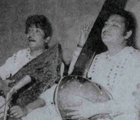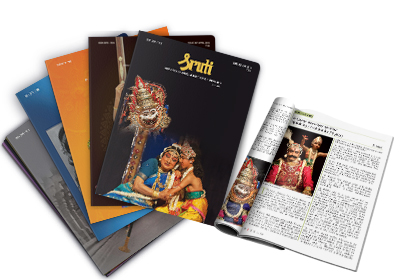Main Feature
Bade Fatesh Ali Khan

The mid-1960s and early 1970s were an interesting period in the history of the subcontinent. Even as Indian and Pakistani generals intermittently unleashed their hardware against each other, leading musicians from Pakistan invaded Indian hearts with impunity and took prisoners by the million. Amongst the most successful conquerors were Amanat Ali Khan and Fateh Ali Khan, the singing brothers from Lahore. Fateh Ali Khan (born: 1935) is the younger, who turned soloist after the demise of Amanat Ali (1932-1974). Together, the brothers achieved the highest official recognition and immense popularity in Pakistan, while the survivor, Fateh Ali, is now amongst the foremost vocalists across the border. The "Bade" (elder) prefix to his name became necessary to avoid confusion outside the subcontinent after Nusrat Fateh Ali Khan, no relation of his, became an international rage with pop renditions of qawwali.
Their father, Akhtar Hussain, who was a vocalist at the Patiala court, trained Amanat Ali and Fateh Ali. Their grandfather, Ali Baksh, was one of the founders of the Patiala gharana. Amanat Ali and Fateh Ali made a sensational debut as child prodigies in 1945 at Lahore, then in undivided Punjab. The Partition disrupted their life when the family moved to Pakistan and survived destitution. While still in their teens, the brothers returned in 1949 to make a stunning appearance at the All-Bengal Music Conference in Calcutta. That concert catapulted them to the forefront of vocalism on the subcontinent, and triggered off their long affair with Indian audiences.
News & Notes
Prakriti Foundation, Chennai, in association with the Central Sangeet Natak Akademi, organised a three-day Dhrupad Festival from 16-18 February at the Museum Theatre, Egmore in Chennai. The artists featured were vocalists Uday Bhawalkar, Abhay Narayan Mallick, Umakanth and Ramakanth Gundecha, Wasifuddin Dagar, and Rudra veena exponents Bahauddin Dagar and Asad Ali Khan.
Dhrupad is "the other" tradition of North Indian classical music, the mainstream classical music style in the North today being the khayal. Not very long ago, however, the situation was quite the reverse. If, today, Bhimsen Joshi and Kishori Amonkar—well known names in the North Indian classical music tradition, are khayal singers, a few centuries ago Mian Tansen, Swami Haridas, and Baiju—well known names then and now, were dhrupad singers. To call the dhrupad the "other" tradition may be misleading since the dhrupad is the older tradition. It was the khayal that began as an upstart, different from the mainstream dhrupad. Dhrupadia-s constantly aver that the nature of their music is spiritual; they sing not to entertain, but to evoke feelings of devotion, and indeed, spiritual peace and calm. But the dhrupad is the "other" tradition in the sense it is conscious and jealously protective of its separate identity, seeking to uphold its "different-ness" and prestige.


